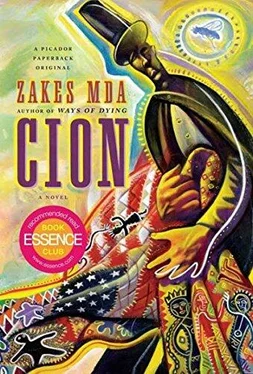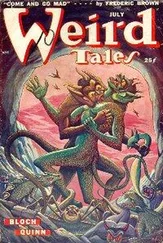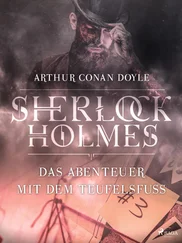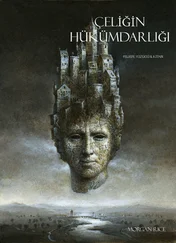I wonder why Beth Eddy became Beth Eddy to us and not just Beth.
“Ruth, she don’t do nothing ’cause she’s thinking about a bunch of religious crap all the time,” Orpah adds.
“We’ll see if it’s crap when you go to hell,” says Obed.
“Ain’t no hell but Kilvert,” says Orpah.
“That’s a lot of bull and you know it,” says Obed. “Ain’t no better place than Kilvert. Kilvert’s gonna be heaven when I’m done with my casino.”

I have got to help Ruth. Next morning I do not go quilting but take the short walk to her house. The chimes and Orpah’s sitar take me back to my stay here. I was happy here. I have missed this house. I have missed Ruth.
My body tingles at the sitar. The sitar has a way of playing these random games with me. Sometimes it is just pleasant music and does nothing more. Like when she played at the bluegrass festival. At other times it arouses me to madness. Perhaps it is the particular song that she plays at the time. The particular mood she is in when she plays it.
Ruth is at her workstation but she is not doing any work. She is just sitting staring at a pile of fabric. The first thing she utters when I walk in is: “Where them kids at?”
I don’t know where Obed is, I tell her. But Orpah must be in her room for I can hear her sitar. Surely she can hear it too? She starts complaining about how I have been a negative influence on her children since they no longer spend their time at home. Before I came here they used to listen to her. Can I believe that even Mr. Quigley is doing naughty things he would never dream of doing before I came here? For instance, she found dandelion moonshine in Obed’s bedroom. She only learned later to her utter shock that Mr. Quigley was involved in the manufacture of this potent beverage from the dandelion flowers.
“Mr. Quigley shouldn’t do such stuff with them kids,” she says. Between sobs she says that the first Quigley, Lord have mercy on him, must be turning in his grave when his descendants are behaving in this manner. The first Quigley was a man of God and a prophet. It is unfortunate that none of the men who came after him followed his path of righteousness.
“Mr. Quigley will go to hell one of them days,” she says.
“I hope this will make you feel better,” I say, giving her five twenty-dollar notes.
She looks at me for a while, and then smiles. She shakes her head and withdraws both her hands to her ample chest.
“Better you give it to them starving kids in Ethiopia,” she says.
“Okay,” I say, “I am buying a quilt with it…from you.”
“Ain’t got no quilt to sell,” she says. And then adds with emphasis: “To you.”
She insists I can’t leave without drinking her sassafras tea. She says she also has corn bread for me; despite the lies that Orpah must have told me that there is no food in her house. I stay with her for a while, eating her corn bread with the tea and listening to her latest political hobbyhorse. This time it has to do with crime that is creeping into such peaceful places as Kilvert. They should hang the criminals and they will learn a good lesson. Folks need guns to protect themselves. She announces grandly that she is pro-gun and pro-death penalty. Yet she is pro-life!
I tell her that I am pro-death. How else do I mourn without death?
“The best thing you can do for me,” she says when I am about to leave, “is to get me some gingham from Africa. They must still have it there. Old-timers used gingham for their quilts. You can’t buy it in the U.S. of A. no more. I wanna make my quilts with gingham and you’ll see how folks gonna buy them like they was hot cakes.”

It must be after midnight. I can hear the sitar. Maybe it is just whining in my head, for the house is too far to actually hear it from here. But I can hear it as clear as if it was just outside the RV. And it does to me what it did that first night. The night I had to flee from my own erection. This time I will not flee. I will challenge it. I wake up and put on my jeans, plaid shirt and sneakers. I practically run to the house.
I hide behind Mahlon’s bush and abuse myself. If the asylum at The Ridges were still in operation I would abuse myself all the way to Athens and get myself committed. That is what this sitar is doing to my head and my body. Just as the rhythm gets faster I stop abruptly. Mahlon is walking to Orpah’s room. He must have come out through the kitchen door. He must have dressed up in his own bedroom, which confirms my suspicion that Ruth knows all about his nighttime shenanigans.
Tonight he is in a dark double-breasted frock coat of a Union Army major general, white gloves, gold epaulettes, dark pants and Nike sneakers. His black Confederate officer’s slouch hat is too big for his head. He walks stylishly swinging a sword.
The music stops as he floats into Orpah’s room. And then the laughter and the mumblings and the screeching. I want to hear what they are saying. A little devil in me tells me to kick the door and barge in. Instead I walk closer to the window. I almost place my ear against the pane, making sure that I don’t touch it lest they discover me before I discover what they are up to, in which case my mission to save Orpah from the man and from herself will flop.
Through the slits between the worn blinds I can see Mahlon pacing the floor as he recites something about a long journey that Massa Blue Fly undertakes over snowy hills and through forests devoid of leaves. He buzzes like a fly and Orpah laughs like a little girl. I can’t see her though. She must be somewhere on or near the bed. Mahlon “flies” around the room, his arms outstretched like the wings of a plane. The more he flies with the buzzing sound the harder Orpah laughs. And then he stops the flying and resumes tracing the long journey across frozen rivers and down slippery slopes. Until Massa Blue Fly arrives at his destination and gives some good news to the Abyssinian Queen. Somehow ghost orchids find their way into the celebrations that follow Massa Blue Fly’s good news. Ghost orchids float in the sky and fall on the ground and on the flowing robes of the dancers. The Abyssinian Queen swoops down from the topmost branch of a ghost tree and floats with the ghost orchids.
I can hear Orpah and Mahlon clapping their hands and singing “The Song of Massa Blue Fly.” The singing is far from being wonderful. Neither singer seems to take their singing seriously. It is obvious that the song is being improvised on the spot and the singers mix it with laughter. I am hoping she will play the sitar but she never does.
Mahlon says, “Shhhhh,” and they are both silent.
He is very close to the window.
The blinds are suddenly yanked open and the light splashes all over me. Mahlon is smiling at me menacingly. Surely he is going to kill me this time. He opens the door and says, “Why not come in if you wanna hear right?”
I walk into Orpah’s mother-in-law room. The Marilyn Monroe cut-outs are stacked on one side to create more room. Orpah is sitting in a Buddha-like pose on the bed and is in the pirate’s costume she was wearing that first night, although tonight she is wearing a maroon Victorian bonnet. She does not look amused at all.
“He can’t come in,” she says. “He ain’t got no costume.”
“It don’t matter,” says Mahlon. “Let him stay. Let him see what he wanna see.”
“I promise I’ll be quiet,” I say. “I won’t utter a word.”
She does not address me. She’s not even looking at me but at her father when she says, still in a little girl’s voice: “Without costume he’s like naked. You don’t do them memories when you’re naked.”
Читать дальше













